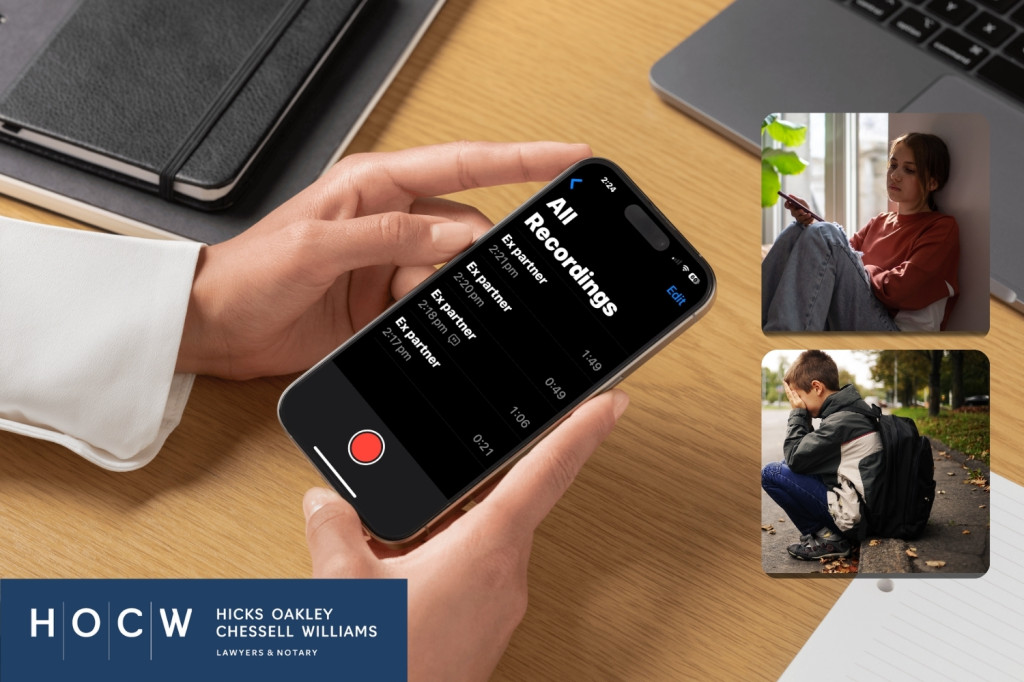Can You Record Your Ex? What You Need to Know Before You Hit ‘Record’
In today's digital world, it has never been easier to press “record.” Smartphones, doorbell cameras, and even smartwatches allow anyone to capture conversations with the push of a button.
In parenting disputes, family lawyers are increasingly seeing clients walk in with secret recordings - conversations with their ex-partner, arguments at changeovers, or even recordings of their children, hoping this will be the evidence that wins their case.
But as many experienced family lawyers know, covert recordings are a legal and ethical minefield. Here’s why.
What the Law Says
In most Australian states and territories, it is a criminal offence to secretly record private conversations. The maximum penalties for illegal recordings include:
Victoria: Up to $39,652.80 fine or 2 years imprisonment
NSW: $11,000 fine or 5 years imprisonment
ACT: $5,500 fine or 6 months imprisonment
Tasmania: $6,520 fine or 2 years imprisonment
WA: $5,000 fine or 12 months imprisonment
SA: $10,000 fine or 2 years imprisonment
NT: $38,750 fine or 2 years imprisonment
Queensland: $5,338 fine or 2 years imprisonment
Commonwealth laws also apply, particularly the Telecommunications (Interception and Access) Act 1979 and Surveillance Devices Act 2004.
In Victoria, under section 11(2)(b)(ii) of the Surveillance Devices Act 1999, a person may argue that they made a recording to protect their legal interests. This is the most common defence put forward when people seek to rely on secret recordings in court.
What the Courts Have Said
Where the Court has allowed recordings
In Coulter & Coulter (No 2) [2019] FCCA 1290, the mother recorded changeovers due to safety concerns. The court allowed the video but excluded the audio, finding it did not relate to protecting her legal interests.
In Janssen & Janssen [2016] FamCA 345, the court accepted secret recordings that supported allegations of family violence. The judge found they were made to protect the mother’s legal interests.
In Gin & Hing [2019] FamCA 779 the father’s recordings were allowed because they helped the court assess what was in the best interests of the child.
Where the Court has not allowed recordings
In Masri v Masri [2017] FamCA 539, both parents tried to rely on secret recordings. The Court refused to admit them, noting that the fact the recordings related to were not central to the outcome.
Where recordings backfire
In Farrelly & Kaling [2012] FMCAfam 210, the father submitted more than 70 recordings. A court-appointed expert criticised the approach, and it damaged the father’s case.
Just Because You Can, Doesn’t Mean You Should
Even if a recording was obtained illegally, the court may still allow it to be used under section 138(1) of the Evidence Act 1995 (Cth), but only after weighing factors like:
How useful and important the evidence is
How serious the legal breach was
Whether the breach was deliberate
Whether it could be avoided
Whether it would unfairly harm the other party’s case
The court may exclude the evidence if it is unfair, confusing, or a waste of time.
Why the Family Court Are Cautious About Secret Recordings
The Family Court’s focus is not on “catching out” the other parent, but on making decisions in the best interests of the child.
When a parent submits a secret recording, the court may see it as:
A lack of understanding of how the situation might affect the child emotionally
Manipulative or staged, especially if the child appears to be prompted
An attempt to provoke conflict
Harmful to the child’s long-term wellbeing
Children should never be used as tools to gather evidence. Knowing they are being recorded can make them feel conflicted, unsafe or pressured to take sides. This can damage their mental health and relationship with one or both parents. Courts take this seriously.
Better Alternatives to Secret Recordings
If you are concerned about your child’s safety or welfare, there are more appropriate ways to gather evidence:
Request a Family Report or Child Impact Report
Ask the court to appoint an Independent Children’s Lawyer
Gather text messages, emails or other written communications
Obtain statements from professionals such as doctors or school staff
Subpoena relevant records or reports from government agencies
These options are more likely to support your case and be accepted by the court.
For Lawyers: A Note on Strategy
As practitioners, it’s easy to treat secret recordings as compelling evidence, but this approach can backfire.
Always assess:
Was the recording obtained legally?
Is relying on it ethical and proportionate?
Could it damage your client’s credibility?
Will it assist or undermine the child’s best interests?
A child-focused, evidence-informed strategy will always serve your client better than a high-risk shortcut.
Final Thoughts
Secret recordings may feel like useful evidence, but they often raise legal, ethical and practical issues. Even if allowed, they can reflect poorly on a parent and harm the case.
Focus on what matters most: the child’s wellbeing. Courts are more persuaded by respectful, child-focused approaches than by attempts to catch the other parent out.
When in doubt, seek legal advice before pressing record.



